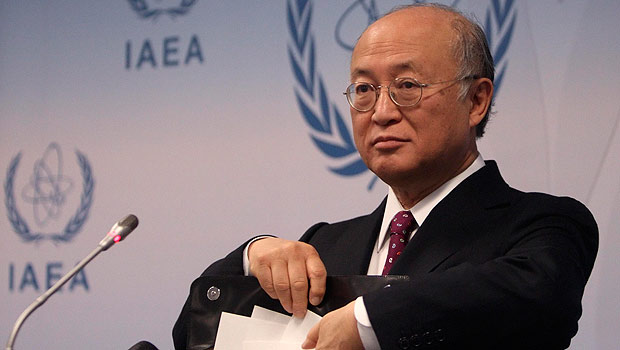For more than two years Syria has blocked International Atomic Energy Agency (IAEA) access to the remains of a desert site that US intelligence reports say was a nascent North Korean-designed nuclear reactor intended to produce bomb fuel.
The site, known as either Al-Kibar or Dair Alzour, was bombed to rubble by Israel in 2007. Syria, an ally of Iran, denies ever having an atom bomb program.
In a report last month Yukiya Amano, the IAEA director general, said Syria was not allowing UN nuclear inspectors to visit numerous suspect sites, and had provided scant or inconsistent information about its atomic activities.
On Thursday, he told the IAEA’s 35-nation governing board he had written a letter to Syrian Foreign Minister Walid Al-Moualem on Nov. 18, the first time the IAEA chief has appealed to Syrian authorities directly, rather than just through his reports.
He asked the government to provide prompt IAEA access to relevant information and locations related to Dair Alzour and to cooperate with the agency in general, Amano told the closed-door meeting, according to a copy of his speech.
A diplomat close to the probe said the letter reflected the “growing urgency” of the matter. The agency wants to re-examine Dair Alzour so it can take samples from rubble removed immediately after the air strike.
Washington has said the IAEA may need to consider invoking its “special inspection” mechanism to give it the authority to look anywhere necessary in Syria at short notice.
But diplomats and analysts believe the IAEA will refrain from escalating the dispute at a time of rising tension with Iran, which the West suspects of seeking nuclear weapons.
Syria says the IAEA does not need to go back to Dair Alzour because it already has proof it was a non-nuclear military site. It has also suggested uranium particles found at the site came from Israeli weapons or were dropped from the air, an assertion dismissed by the West.
The IAEA also wants access to three other Syrian sites under military control whose appearance was altered by landscaping after inspectors asked to visit.
The IAEA chief also complained about Iran’s lack of cooperation with his inspectors, four days before long-stalled talks resume between Tehran and major powers.
“The agency needs Iran’s cooperation in clarifying outstanding issues which give rise to concerns about possible military dimensions to its nuclear program, including by providing access to all sites, equipment, persons and documents requested by the agency,” Amano said in a speech.
Throwing independent weight behind the West’s suspicions about Tehran’s atomic ambitions, Amano said in a report on Iran in February that the IAEA feared Tehran may be working now to develop a nuclear-armed missile.
His latest report on Iran, to be debated at the meeting, reiterated that Tehran was not providing the necessary cooperation to permit the IAEA to confirm that all of its nuclear activities are peaceful.
Iran has accused Amano of bias and relations soured further in June when Amano said Iran’s barring of some IAEA inspectors were hampering the agency’s work. It says it is fully cooperating with the agency.
With Iran saying its nuclear rights are non-negotiable, diplomats and analysts do not expect any breakthrough at the Dec. 6-7 talks in Geneva between Iranian nuclear negotiator Saeed Jalili and European Union foreign policy chief Catherine Ashton.
They say the first such meeting in more than a year could be the start of a process the West hopes will eventually lead to a resolution of the row, which has the potential to provoke a regional arms race and military conflict.
Amano said he was also worried by reports North Korea has built a state-of-the-art uranium enrichment facility.
“It was with great concern that I learned of recent reports about a new uranium enrichment facility, as well as the construction of a new light water reactor, in the DPRK” or Democratic People’s Republic of Korea, Amano said.
Earlier this month a US scientist revealed he had been shown a new uranium enrichment plant at the Yongbyon nuclear complex outside the capital North Korean capital Pyongyang.
The news has heightened international concern that North Korea — which has conducted two nuclear weapons tests — could produce highly-enriched weapons-grade uranium on top of the plutonium already in its possession.
The IAEA is not in a position to verify the reports since its inspectors have been barred from North Korea since last year.










